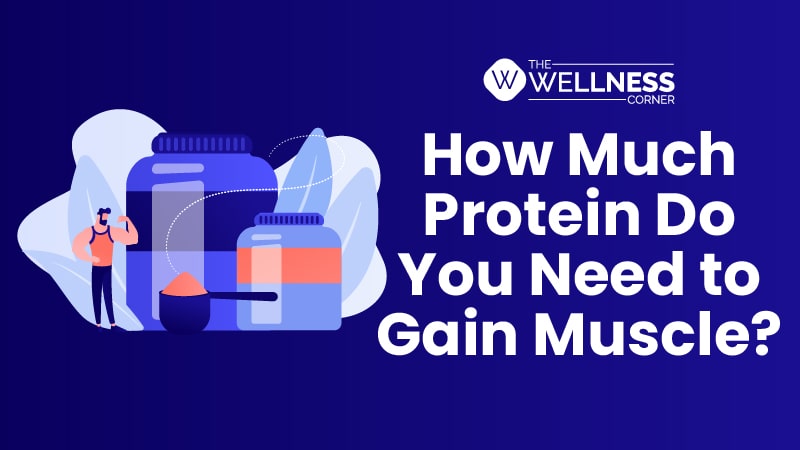How Much Protein Do You Need to Gain Muscle?
- 41 months ago
Muscle is largely made up of protein, and it's no surprise that eating a high-protein meal can help you gain more of it. It's questionable how much protein you require each day. The science behind this advice differs significantly depending on age, exercise habits, and overall body composition goals.
Most fitness gurus & trainers suggest consuming 1gm protein per pound of the total body weight to assist complete muscle building, but the science behind this advice varies depending on age, general fitness, and overall body formation goals.
Let’s check out some facts about proteins and their importance in muscle gain.
What is Protein?
Proteins are the body's basic structural blocks that provide strength to our body. Muscles, skin, tendons, and organs, as well as enzymes, hormones, neurovascular, and a variety of other compounds, are all made using them.
They are made up of simpler compounds known as amino acids that connect like beads on a thread. Long protein chains are formed from these connected amino acids, which subsequently fold into complicated forms.
Most of these amino acids are produced by your body, while others, known as essential amino acids, must be obtained from your food.
Protein isn't only about the quantity; it's also about the quality.
Importance of Protein in Muscle Building
Protein makes up a large part of our bodies, including muscle, bones, skin, and hair. Because of its vast functioning, our bodies have a continual flux of proteins, with some being destroyed down (catabolism) and others being formed (anabolism).
Exercising stresses our muscles, causing small rips or damage in the muscle proteins that must be mended. More calories and protein in our meals than we burn give the key components for our muscles to get in the recovery and growing stage over time.
Do you know about the right protein intake? Read below!
How to Calculate Your Protein Need?
Protein is limited to 0.8 gm per kilogram of the body weight in the Recommended Dietary Allowance (RDA). The RDA is the daily recommended amount of a nutrient to fulfill your basic nutritional needs. In a way, it's the bare minimum you need to avoid becoming sick — not the exact quantity you should consume every day.
You can multiply your weight in pounds by 0.36 to estimate your everyday protein consumption. For a 50-year-old woman who weighs 140 pounds and does not exercise, the amount of protein consumption should be approx 53 gm per day.
Protein-rich Foods for Muscle Building
Once you've determined your daily protein requirements, the following step is to determine the finest protein sources to consume. Meats, seafood, dairy, and plant-based foods are among them.
Then, to maintain consistency, learn how to portion your meal selections to fit your macros and begin monitoring your daily consumption.
Before you start your regular protein consumption, think about the following:
"Get more protein" does not imply "eat more meat." Many plant foods, like whole grains, beans, legumes, nuts, and vegetables, are rich in protein, the same as beef and chicken (also milk, cheese, and eggs).
Following is a list of general protein-rich foods that you can consider eating:
|
Category |
Food Type |
Amount of Protein per 100 gm |
|
Meat |
Chicken |
31 gm |
|
Beef |
26gm |
|
|
Fish |
Salmon |
22 gm |
|
Sardines |
25 gm |
|
|
Tuna |
24 gm |
|
|
Nuts & Seeds |
Chia Seeds |
16 gm |
|
Almonds |
21 gm |
|
|
Peanuts |
24 gm |
|
|
Eggs |
Whole Eggs |
12 gm |
|
Egg Whites |
11 gm |
|
|
Dairy Products |
Skimmed milk |
3.5 gm |
|
Greek Yogurt |
6 gm |
|
|
Cheddar Cheese |
25 gm |
|
|
Soy Products |
Soy Beans |
11 gm |
Key Takeaways
As the building block of our body, protein should always be consumed in a prescribed quantity depending on our age, physical fitness, and other factors. Always calculate your protein intake before increasing the dose.








